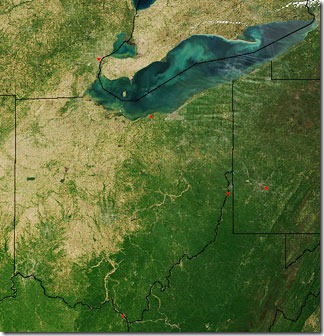Army Corps says regular lock closures won’t stop Asian carp
1 After several failed Supreme Court appeals, hopes of closing Chicago’s locks to stop the Asian carp fell on the US Army Corps of Engineers. Those hopes were dashed last week when the Corps decided against regularly closing two locks, saying that anything short of permanently closing them would do little to stop the invasive species from reaching the Great Lakes.
After several failed Supreme Court appeals, hopes of closing Chicago’s locks to stop the Asian carp fell on the US Army Corps of Engineers. Those hopes were dashed last week when the Corps decided against regularly closing two locks, saying that anything short of permanently closing them would do little to stop the invasive species from reaching the Great Lakes.
“USACE considered many factors in this assessment of potential use of structures, including impacts to the environment, local and regional economy, health, and safety,” said Colonel Vincent Quarles, Commander of the U.S. Army Corps of Engineers in Chicago. “Our analysis incorporated information gathered from US FWS and other Asian carp experts. In the end the analysis showed that using measures such as temporary lock closures will do very little to reduce the risk of Asian carp migration.”
The possibility of permanently closing the locks, creating complete ecological separation between the Great Lakes and the Mississippi River system, will be a part of a long-term USACE study.
USACE explored six options for routine lock closures, such as closing the locks every other week, for two months, or one week per month, but the study concluded none of them would sufficiently inhibit the carp’s migration to Lake Michigan.
“Out of the six alternatives considered by the Risk Assessment Panel, there was no alternative or combination of alternatives that the Panel Members determined would lower the risk of Asian carps establishing self-sustaining populations in Lake Michigan to an acceptable level,” the report stated [PDF].
The Corps did recommend, however, that the locks continued to be temporarily closed when fish poisons or other methods are used to search for carp in the shipping channels. The locks were closed in such a fashion when officials introduced the fish toxin rotenone in the Little Calumet River on May 20.
That study turned up no Asian carp, making the case harder for those in favor of lock closure — an argument that still relies heavily on DNA evidence of the carp that was discovered last year beyond the electric barrier.
Michigan and other neighboring states have pleaded unsuccessfully with the Obama administration, Congress, and the Supreme Court to close the locks immediately, fearing that they provide the carp with easy access to Lake Michigan and endanger the lake’s ecology as well as the area’s multi-billion dollar fishing industry. They’ll have to wait yet again for the chance of lock closures as USACE studies the possibility of permanent separation.
To see the Corps’ complete report, download the PDF at: http://www.lrc.usace.army.mil/pao/02June2010_InterimIIIA.pdf
Army Corps rejects regular lock closures to foil Asian carp [Chicago Tribune]
ACRCC releases new studies related to Asian carp fight [PDF] [Asian Carp Regional Coordinating Committee ]
Interim IIIA: Illinois and Chicago Area Waterways Risk Reduction Study & Integrated Environmental Assessment [PDF] [US Army Corps of Engineers]
Dispersal Barrier Efficacy Study [PDF] [US Army Corps of Engineers]
Image Credit: T. Lawrence, Great Lakes Fishery Management














[…] US Army Corps of Engineers decided earlier this month that regular, periodic locks closures would do little to stop the invasive species from reaching the Great Lakes. The Corps is now conducting a long-term study regarding permanent […]